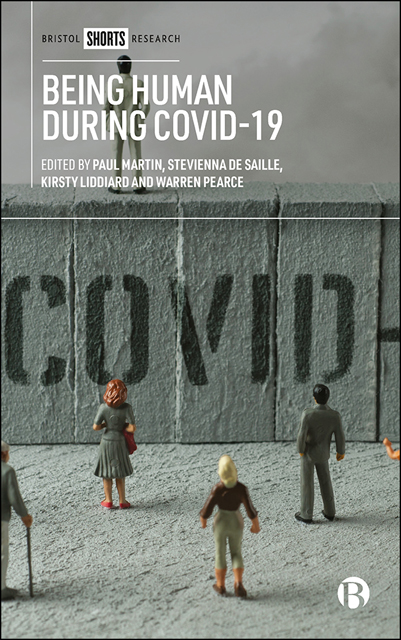Conclusion: Thinking about ‘the Human’ during COVID-19 Times - Conclusion
Published online by Cambridge University Press: 13 October 2022
Summary
In this final chapter we draw together some of the main themes emerging from the various chapters and reflect on what this tells us about being human in COVID-19 times. As outlined in the introduction, these essays have focused on three key issues during the pandemic that are fundamentally concerned with the experience, meaning and understanding of being human. Firstly, the marginalization of many groups of people and how they are de/valued in the response to the virus. Secondly, the role of new scientific knowledge and other forms of expertise in these processes of inclusion and exclusion. Thirdly, the remaking and reordering of society as a result of the pandemic and the opening up of new futures for work, the environment, culture and daily life. These themes were considered in the four sections of the collection, and the main points from each are summarized here, before a final consideration is offered on what this tells us about being human during and after the pandemic.
Knowing humans
This collection of essays starts by exploring how COVID-19 has been known and represented in different metaphors, models, representations, and media, as the pandemic has unfolded. In analysing these processes, new insights are provided about how we understand the human. While the virus was the same molecular structure the world over (at least before the onset of variants), this section shows the myriad of different methods and resources by which the resulting disease and its impacts became known to policymakers, professionals and publics, and how these differed across the world. Three key features of this emerge. Firstly, whether through science, metaphor or imagery, the ways in which COVID-19 became known could both exacerbate existing inequalities or provide the means to counter them (Nerlich; Ballo and Pearce; Rosvik et al). In this sense, they form the ground for contestation over the meaning of COVID-19. Secondly, citizens found themselves dislocated from established sources of knowledge about the virus, which they felt to be either incomplete or inadequate (Garcia; Vicari and Yang; Rostvik et al). These uncertainties about what risks they faced, how to respond, and their responsibilities to self and others, fed into high levels of distrust and confusion.
- Type
- Chapter
- Information
- Being Human during COVID-19 , pp. 147 - 155Publisher: Bristol University PressPrint publication year: 2022



